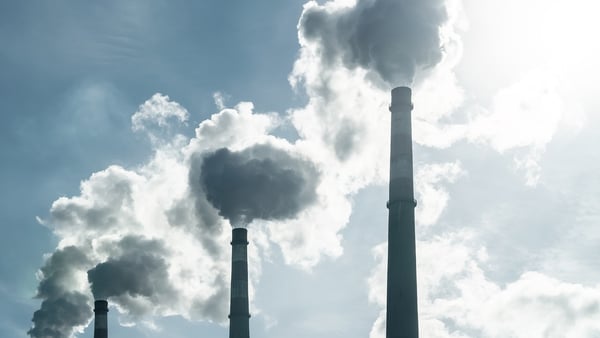Research by scientists at Maynooth University has revealed a very substantial increase in the likelihood and extent of extreme heat events in Ireland.
It found Ireland is now 20 times more likely than 80 years ago to experience its highest ever recorded temperature of 33.3C.
Two years ago, on 18 July, the Phoenix Park weather station registered the warmest temperature ever recorded in the Dublin region.
It was 33C, just below the nationwide all-time record of 33.3C.
This study from Maynooth University focussed specifically on how often we can expect extremes like that to return, and how big an area would be affected.
We need your consent to load this rte-player contentWe use rte-player to manage extra content that can set cookies on your device and collect data about your activity. Please review their details and accept them to load the content.Manage Preferences
The answer they found was that temperatures that high have gone from a one-in-180-year-event to being a one-in-nine-year event in Ireland, making them 20 times more likely to occur.
They also found the spatial impact of extreme heat has more than doubled here, meaning far more people will be impacted each time.
Ireland could see 34C heat in three-to-five years
The lead author of the report, Professor Andrew Parnell of the Hamilton Institute at Maynooth University, said the findings have profound implications for public health, agriculture, economic stability, and infrastructure resilience.
He said he expects to see 34C in the next three-to-five years, underscoring how urgent it is for society to adapt and prepare for extreme heat.
"We are going to have to suffer because there will be heatwave events that are really, really hard for us to live through," he said.
Ireland has never experienced 34C of heat. But this study suggests we would do well to prepare for it.
It said 34C has gone from a one-in-1,600-year event to being a one-in-28-year event, making it 57 times more likely to occur than 80 years ago.
Previous scientific studies of temperature events in Ireland have focused on the mean temperatures recorded over periods of time.
Extreme heat - Eight things to know:
- The highest temperature ever recorded nationwide in Ireland was 33.3C
- The highest temperature ever recorded in Dublin was 33C in the Phoenix Park in July 2022
- Temperatures this high are 20 times more likely than 80 years ago and can now be expected once every nine years
- The geographic area impact by each extreme heat event has doubled in 80 years
- Ireland has never experienced 34C
- Temperature of 34C in Ireland is 57 times more likely than 80 years ago
- Scientists expect 34C in the next three to five years
- Extreme heat events impact on health, agriculture and the economy
This study differs because it focusses instead on the highest temperatures recorded each year and how likely they are to return, rather than on the average or mean temperature.
Prof Parnell said: "We are often focused on average changes, and particularly focus on the Paris Climate Agreement of 1.5C.
"What we have shown here is that the changes in extremes are much larger than the changes in the average and are something we should be seriously concerned about.
"This has implications for health because we will see much higher admissions into hospitals during extreme heat. It causes problems for agriculture as all kinds of crops depend on our climate.
"And as that all shifts, we really don't know exactly what will happen to our economy, to our agriculture and our health system. That's what we're really starting to look at.
"These things can be much more frequent. We need to follow through on our climate commitments. We need to make sure that we adapt, and we're prepared for these kinds of things."
The study was carried out by a team of researchers led by Prof Parnell and Dr Dáire Healy of the Hamilton Institute at Maynooth University, in collaboration with Professor Peter Thorne of MU's ICARUS Climate Research Centre and Professor Jonathan Tawn of Lancaster University.







